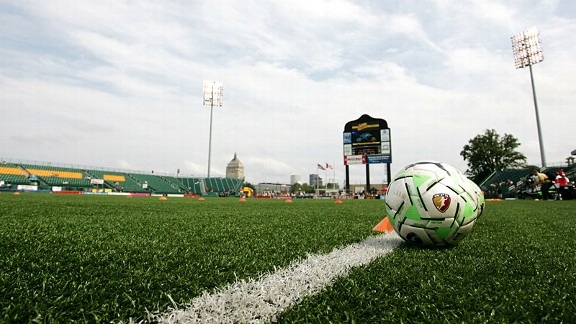
How will the suspension of Women's Professional Soccer for the 2012 season affect the U.S.'s ability to prepare for the Olympics -- and beyond? Photo Courtesy of Andy Mead/Icon SMI
Women’s soccer looks ahead with uncertainty
It wasn’t the first time women’s professional soccer had a setback.
On Tuesday, the Women’s Professional Soccer League (WPS) announced in a press release that it was going to suspend its operations for the 2012 season.
“We are proud of what the League has accomplished in the first three seasons, but we do recognize the necessity to resolve our existing legal and operational issues so that we can continue to support and grow WPS the right way,” said Sky Blue FC Owner Thomas Holfstetter. “This was a very difficult decision, but one we as owners feel is the best business decision for the League at this time.”
The Board voted on Monday to suspend the 2012 season, but the WPS has established its plans to return to play in 2013 according to the press release.
The League was down to only five teams, all of which were on the East Coast. The teams that had made the League stretch across the country, The Los Angeles Sol, Saint Louis Athletica, Northern California’s FC Gold Pride, and the Chicago Red Stars had all folded since the league began in 2009.
Most of the blame has fallen squarely on the shoulders of magicJack owner Dan Borislow, who had his ownership right suspended by the WPS in October. Borislow proceeded to sue the WPS and as they stated from the onset, the WPS didn’t have enough money for an extended fight in court.
That wasn’t the problem. Julie Foudy, former U.S. team captain pointed out, in December 2011, the U.S. Soccer Federation who overlooks soccer in the U.S., “asked the WPS to provide some type of assurance that ‘minimum standards’ were being met in respect to player salaries, trainers, facilities, operations, etc.”
But why did U.S. Soccer wait so long to sanction it? Hadn’t they seen the problem coming when Borislow had sued the League in October? As Foudy adds, “U.S. Soccer would have done the same but earlier, to a men’s pro soccer league if it had shown issues.”
Eyes still set on London
Just two days after the U.S National Team beat Canada in the CONCACAF final and earned a trip to the London Olympics this summer, momentum has once again shifted. But how will the U.S. women’s team now train without a professional league in the states?
Maybe it’s for the best. Now, head coach Pia Sundhage will have full control of her team until the Games begin. Hope Solo and Abby Wambach had already said they weren’t planning on playing in the league. Sundhage doesn’t have to worry about injuries in WPS games or players having to travel to games instead of practicing with the U.S. team.
Former Sky Blue F.C general manager Gerry Marrone told ESPN’s Jeff Carlisle that the WPS going on hiatus is irrelevant to the Olympics.
“The players were only going to be available for eight games and would only train with their teams when the national team made them available,” Marrone said. “I think it will have zero impact on Olympic preparation. And I think for any player who is carrying an injury it will be a positive.”
Of course there is a downside to all of this: American player development. As other countries continue to play in the off-season, where will U.S. players go? And after the Olympics, the problem will still be the same. In the short term, the U.S. will be fine, using the extra time to heal injuries and practice as a team. But what about in the long run? The WPS has to make a comeback. Without it, other countries will continue to make strides and gain ground on a program that’s already losing it.
Leave a Reply